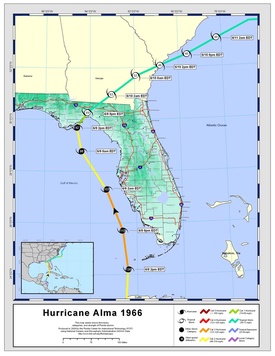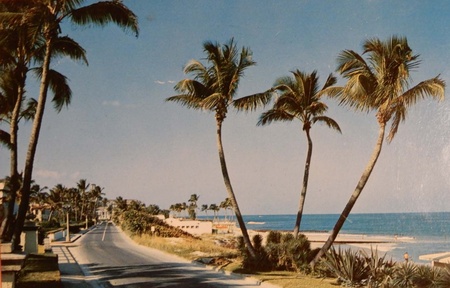Morikami Sukeji came to America as a member of the Yamato Colony in South Florida, and remained there alone until the end of his life after the colony was disbanded. After the war, he continued to write letters to his sister-in-law and her family, who had lost her husband (Sukeji's younger brother). In 1966, Florida was hit by Hurricane Alma, causing great damage to crops. That autumn, Sukeji turned 80 and had been in America for 60 years. He says that 1966 was the worst year ever, but that he still had a lot he wanted to do.
* * * * *
June 9, 1966

My sister-in-law, Mi-san, has been suffering from her arthritis for the past three weeks due to the continuous summer weather and rain. Rain and cold are the worst thing she can do. At present, the first typhoon of the year, Alma, is moving north along the west coast of the peninsula. It is moving at 110 miles per hour. It is expected that the damage to crops on the east coast will be severe.
There is no news from home.
July 25, 1966
Thank you for your prompt reply, Mi-san. I think I finally understand the truth about the land (of my parents' house). Still, I'm shocked at XX's irresponsibility. I've never heard about the debt before. I wish you would be more clear about these things from the beginning, as they will continue to happen in the future.
The rain has finally stopped after two months, but it's still scorching hot. Maybe it's because of my age, or maybe I just don't feel like it, but there are quite a few days when I don't go to the fields. But it's cool at night. In the north, especially in the west, there are many days when the temperature is over 100 degrees (about 38 degrees Celsius). Goodbye.
P.S.
I've been in the US for 60 years. My hometown is getting further and further away. Since my sister passed away, I haven't heard from my hometown. Although I'm all alone, I'm lucky to have many close friends. I stopped writing about things that don't interest you.
"Even if it's difficult, I'll continue until the plan is complete."
September 15, 1966
Thank you for your letter, Mi-san. I'm glad that everyone is healthy. I'm working through the pain as usual. No matter how hard it is, I won't stop until the (landscaping) project is complete. This summer has been a rare rainy one after another, and it has been falling since June and shows no signs of stopping, but we don't have enough manpower, so it's too late and the fields are overgrown with grass.
Even if the seeds are planted, they do not grow well (because of the humidity), and most of the fruit rots on the tree. I think that in the near future, the backlash will come and we will have to suffer from cold and drought.
The US economy is still booming, but even though salaries are rising, prices, especially food, are rising, and life is not that easy. According to one expert, there will be a backlash and we will experience the same kind of global depression as in the 1920s and 1930s. I understand your sentimental feelings well, even though I have never known the love of a mother. Take care of yourself. Health is the foundation of happiness.
"Should I be happy or sad about turning 80?"
November 7, 1966
Dear Mi-san, I received your letter of October 28th. I'm glad that you were able to clean up the aftermath of the typhoon. The selfishness of the landlord makes people like you who are trying to avoid trouble take advantage of it. Make sure to keep receipts for the repairs and claim them when you have the chance, or have them deducted from your rent.
Regarding my father's inheritance, I have clearly asked ○○ to handle it, so I believe the procedures will be completed in no time.
There have been two major floods here due to typhoons, and several acres of farmland are in a terrible state. The weather has finally improved since the beginning of November, and it is cool enough to need a sweater in the mornings and evenings. The typhoon season for this year will end on the 15th.
This year was one of the worst years of my life. I got sick, I suffered natural disasters. Nothing went as I expected, and I was not even able to see my only sister again. Now I live in a world of darkness. No matter how much of a fate I was born with, this made me realize just how miserable life is.
Prices are rising all over the world, and I know the market price of vegetables in Japan from paper. Here too, out-of-season vegetables are very expensive, so I don't feel like buying them, and I make do with what I have in stock, including canned and bottled goods.
Today is Sunday, so I decided to take the day off work and write letters to people I haven't seen in a while.
<Enjoy Japanese sake on your birthday>
The day before yesterday, the 5th, was my birthday. While I was being careless, Toto turned 80 years old, and I don't know whether to be happy or sad, but I feel a strange feeling that I can't describe. For dinner, several of my close friends (all white) gathered, and one of them knew how to cook Japanese food, so we celebrated with all Japanese food. It had been a long time since I had tasted Hakutsuru sake in that small cup.
The long rainy season has finally come to an end, and the pain in my arms has subsided, so I've decided to start tinkering with the soil.
"I don't speak Japanese, and I don't read Japanese books or newspapers."
January 25, 1967
Rei-san (niece), how are you? I found your old letters last night and it made me nostalgic, so I decided to write you. We both had our faults and misunderstandings. Let's not talk about the past. I haven't changed at all. I'll ask my mother for more details. I haven't heard from you since my sister died.
News from home gets fewer and fewer every year. Now I only come from Kyoto occasionally. I am fortunate to be in good health, but I suffer from the arthritis that comes on when the weather changes. Last year was particularly bad. At one point I was unable to walk for a long time, and my hands were disabled, and I felt the misery of loneliness.
I still live in the city, but I go to the farm every day. I've been passionate about growing tropical fruit trees for the past few years. I'll be done planting in about two years. This will make my 60-year-old dream come true.
The old Issei in this region are almost all dead. The Nisei and Sansei are scattered all over the place, but I don't particularly want to meet them. Even if I did meet them, I wouldn't feel anything. I haven't spoken Japanese for a long time, and I haven't read any Japanese books or newspapers, so I forget the characters and can't remember the names of things. It's hard to write letters. I'm getting further away from home every year, but fortunately I have quite a few close friends here, so I don't feel lonely.
I often have dreams. I often have them during the day. They are not dreams but fantasies, but I always enjoy thinking about something more than anything. I have gotten older, but my mood is the same as before. There are a mountain of things I want to do, and sometimes I think about silly things, like if there was no death for humans and I could live forever.
It's the season in Florida
Florida is in the middle of the season now. It's crowded with people and cars. The weather is perfect. Daytime temperatures are about 80 degrees (about 27 degrees Celsius), and nighttime temperatures are about 70 degrees (about 21 degrees Celsius). The US economy is booming, but rising prices mean life isn't that easy. It's probably the same in Japan. Rei, do you have any children yet? Families without children are lonely.
It is now exactly 8am. The weather forecast is cloudy with showers. Today is the perfect day for replanting Japanese black pine and Uji tea seedlings. Last year, I planted three Japanese cherry trees (2 kinds), one maple tree (with autumn leaves), and Tamba chestnuts (all from here). The results look good. I planted a jin (about 600 grams) of Yusura plum seeds that I ordered from Japan. I hope it goes well, but the seeds from Japan don't always produce good results. Last year, I planted three Japanese cherry trees (2 kinds), one maple tree (with autumn leaves), and Tamba chestnuts (all from here).
I like tea more than anything, but I don't like Japanese tea. It has no flavor. I prefer Indian tea. People's tastes seem to change with the year and the climate. There are all kinds of food items in Japan, but I never get tired of rice and soy sauce, no matter how many years pass. Americans are starting to eat them too. I could go on and on. I'll stop here for today. Goodbye.
Japanese flower arranging becomes all the rage
February 5, 1967
Aki-chan, thank you for your letter after a long time. It's neither too hot nor too cold here, and it's a total paradise now with fruit trees, vegetables, flowers, etc. in season. At the company, overtime is still happening, and maybe there's a shortage of manpower, or maybe it's to cut costs, but everyone is off on Sundays, Saturdays, and holidays. Time seems to be undisciplined in Japan, though.
Akira just had a dream that he suddenly became a millionaire with $10,000. I'm a little worried about what would happen to Akira if this were to come true. Teenage marriage is also very popular here, but the results seem to be bad. Sex is being touted under the guise of love, so it's no wonder things aren't going so well.
Japanese flower arrangement (ikebana) is very popular here, and all the ladies who have free time are practicing it. Important people in the church are dying one after another. It's almost a heart attack. The good-for-nothing common people don't get sick. It's a total waste of time. It's 11:30, but the temperature is 63 degrees (about 17 degrees Celsius), and in the morning it drops to about 50 degrees (10 degrees Celsius).
"If you plant today and die tomorrow, you will have no regrets"
February 21, 1967
Rei-san, when we are far apart, we become estranged. It is inevitable that we will become estranged from each other. There is nothing more pleasing than hearing from someone after a long time. This is especially so for a person living alone in a faraway land. Rei-san, what is wrong with you? You don't seem to have your usual energy. Are you in a bad mood? Or are you dissatisfied with something? There is a saying that the pasture is always greener on the other side. We can see better in others. Poor people wish they only had money, and rich people regret that they were healthy. That is the way the world is.
I think that if things don't go as planned, you shouldn't get upset or worry, but do your best and then leave it to fate. My life has been a series of failures, but I never gave up hope.
People laugh at me and say I'm stupid for planting trees at the age of 80. It is true that I am stupid, but it is my lifelong wish and dream. If I plant a tree today and die tomorrow, I will have no regrets.
Life is a long dream. Live by your dreams, and die by your dreams. I often dream. The other night, Akiko became 10,000 dollars rich. It was an inheritance from a certain person. What would you do if this happened? I asked Akiko, but she didn't reply. Rei-san, what would you do if you were in her position?
Another dream is that my house was burned down. Nothing was left. I have been saying I would return to Japan for a long time, but I never did, but I think I will be able to do it in two years. As soon as my plan is complete, I will leave it to the neighboring agricultural experiment station (45 English Town, which I donated to the state) to take care of it while I am away, and I will be able to return home at my leisure. Please wait for me. Please do not push yourself too hard. Please write to me again when you have time.
P.S.: In the photo, your mother looks much younger. Akiko has also become more beautiful. I'm troubled by my carelessness, probably due to my age. The other day I lost my dentures in the field, and now I've dropped my watch. I still haven't found either of them.
(Titles omitted)
© 2020 Ryusuke Kawai







